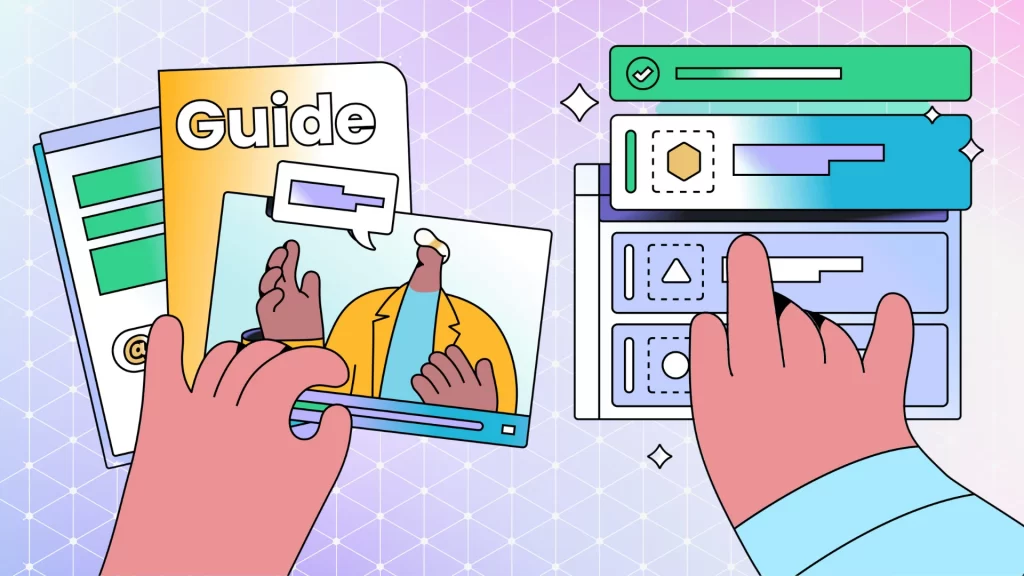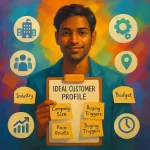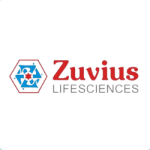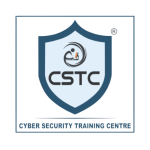What Is Lead Generation and How Does It Work?
Businesses rely on lead generation to identify and connect with people who show potential interest in their products or services. This process helps build a list of individuals who may eventually become customers. A well-planned campaign for lead generation is often the method used to organize and manage this process effectively.
A lead is someone who has interacted with a business in some proven way: by visiting a website, signing up for a newsletter, clicking on an ad, or filling out a form. That said, not all leads are at the same stage of interest. To clarify, They are generally classified into three categories:
- Cold leads – Individuals who have not shown any clear interest or awareness.
- Warm leads – People who are aware of the business and may have engaged with it but are not yet ready to make a decision.
- Hot leads – Leads who have shown strong intent and are more likely to take action, such as making a purchase or requesting more information.
Lead generation involves attracting all three types of leads through various marketing channels and guiding them through a series of steps that build interest and trust. In fact, It is a foundational part of marketing and sales, helping businesses create consistent opportunities for growth.

Why is Lead Generation Important for Your Business?
If you’re running a business, whether you sell fashion, food, beauty, or tech, you know one thing: you need customers to survive. But customers don’t just appear. You have to find them, talk to them, and guide them toward buying. That’s exactly what lead generation does.
Unlike traditional models that rely on retailers or marketplaces, direct-selling businesses need to build personal relationships with their customers. Lead generation helps start that connection by reaching the right people and guiding them toward your product.
Here’s why it matters:
- First, it brings in interested people, not random traffic
- Second, it helps you create a steady flow of potential buyers
- Moreover, it gives you more control over who sees your product and why
- Finally, it improves your return on marketing by focusing only on high-potential leads
Many growing businesses use smart lead generation services to boost their results. Whether it’s through pop-ups on your website, special offers, or email sign-ups on landing pages, each lead is a chance to build trust and boost revenue.
How Lead Generation Works for Growing Businesses
Lead generation is a structured process that helps businesses connect with people who show interest in their product or service. It typically begins the moment someone comes across a brand, whether through search engines, social media, or a referral, and continues through a series of steps designed to turn that interest into action.
For growing businesses, especially, the goal is not just to collect contact details, but to guide potential customers through a journey that builds trust and encourages them to take the next step.
Here’s how the process typically works:
1. Attract the Right People
Not everyone is your customer. Therefore, use social media lead generation: Instagram reels, Facebook ads, or creator shoutouts to reach people who are actually interested in what you sell. The goal is to make them pause and pay attention.
2. Offer Something Valuable
People love getting something in return. For example, whether it’s a discount, free shipping, or a product quiz: offer something useful in exchange for their email or phone number.
3. Collect Their Info & Build the Connection
Use easy forms, pop-ups, or landing pages to gather their details. Importantly, don’t ask for too much, just enough to follow up. Then stay in touch with helpful content, product tips, or exclusive deals.
4. Use SEO to Get Free, High-Intent Leads
Some of your best leads come from Google. A solid SEO strategy helps your site appear when people are already searching for products like yours. These are people ready to buy; they just need to find you first.
It’s a simple cycle:
Attract > Offer > Collect > Convert.
When set up well, this system works 24/7 and helps your business grow without chasing cold audiences. As a result, this approach offers a significant competitive advantage.
Where Do Leads Come From?
If you’re wondering where all these potential customers come from, the answer is: everywhere your audience spends time online. That’s the power of lead generation, you meet people where they already are and guide them toward your business.
Watch: 9 Best Lead Generation Strategies (Free & Paid)
This video explores the top lead generation channels, explaining how platforms like Google, social media, email, and landing pages help attract quality leads.. It supports the blog’s focus on helping readers understand where leads come from and how to attract them through different digital channels..
Key Takeaways:
- Use SEO and content marketing to generate long-term, high-quality leads organically.
- Paid ads (Google, Facebook) work best when paired with a clear, targeted message and landing page.
- Email marketing is one of the highest ROI lead gen tools when used for follow-up and nurturing.
- Combining multiple lead sources creates a sustainable lead generation system over time.
Here are some common sources of leads:
Search Engines (like Google)
People who search for products like yours are already interested. These are high-intent leads. With a strong SEO strategy, your website can appear at the top of search results.
For example, Zouk, a homegrown vegan bag brand, attracts organic traffic through search terms like “vegan office bags for women,” helping them generate consistent leads.
Social Media Platforms
Instagram, Facebook, and LinkedIn are powerful channels for social media lead generation. You can post helpful content, run ads, and guide users to take action.
Your Website or Landing Pages
Your own site can be a strong lead magnet. Add simple pop-ups, offer discounts, or invite visitors to join your newsletter to start collecting leads.
Ads and Email Campaigns
When targeted well, paid ads and email flows can help you reach people who are more likely to become paying customers.
Wherever your audience discovers you- Google, social media, or your website. You have a chance to start a lead generation campaign that brings them closer to a purchase.
What Are Lead Generation Services?
Lead generation services are tools or experts that help businesses find and convert more leads. If you’re running a growing business and can’t manage everything alone, these services can save time and boost results.
Typically, these services often include:
- Paid advertising (Facebook, Google, etc.)
- Landing page creation and optimization
- Email marketing sequences
- SEO strategy to bring in organic traffic
- Managing social media lead generation campaigns
As a result, many businesses choose to work with professionals or agencies who understand how to get quality leads fast. The right partner can help you build a custom lead generation campaign that fits your goals and audience.
For example, Mamaearth, a direct-to-consumer personal care brand, worked with marketing partners to improve its lead generation and customer acquisition. This helped the brand grow from ₹20 crore to over ₹1,000 crore in revenue.
Ultimately, with the right services, you don’t just get more leads. You get the right ones who are ready to buy through a well-targeted campaign for lead generation.
Social Media Lead Generation
Today, social media is not just about likes and followers. It’s a powerful channel to attract, connect with, and convert potential customers. For modern businesses, especially those selling directly to consumers, social media can be the fastest way to start generating leads.
Here’s how you can use it:
Create Content That Connects
To begin with, post helpful or inspiring content, like videos, guides, tips, or behind-the-scenes stories. The goal is to build trust and interest.
Example:
Bare Anatomy, a personalized haircare brand, uses Instagram to share customer experiences, expert tips, and product information that encourages users to explore more or sign up.
View Bare Anatomy on Instagram
Use Built-In Lead Forms
In addition, platforms like Facebook and Instagram offer lead generation ad formats that allow users to fill out their contact information without leaving the app. It’s quick, simple, and mobile-friendly.
Clear Call-to-Actions (CTAs)
Use strong CTAs like “Get your free guide,” “Take the quiz,” or “Sign up for early access.” These give users a clear reason to take action.
When done right, social media lead generation builds both trust and traffic, helping you turn followers into customers without pushing hard sales messages.
SEO Strategy for Lead Generation
Implementing a robust SEO strategy is essential for attracting potential customers to your website. By optimizing your site for search engines, you ensure that your business appears prominently when users search for relevant products or services.
Key Components of an Effective SEO Strategy:
- First and foremost, Keyword Research: Identify and target keywords that your potential customers are using. This includes both broad terms and long-tail keywords specific to your offerings.
- Next, Quality Content: Develop informative and engaging content that addresses the needs and interests of your audience. This not only attracts visitors but also establishes your authority in the industry.
- Additionally, On-Page Optimization: Ensure that your website’s meta tags, headers, and images are optimized for search engines. This enhances your site’s visibility and user experience.
- Furthermore, Link Building: Acquire high-quality backlinks from reputable websites to boost your site’s credibility and search engine ranking.
For example, The Moms Co., a leading Indian personal care brand, effectively utilizes SEO strategies to enhance its online presence. They focus on creating valuable content that resonates with their target audience, which in turn drives organic traffic to their website. Their approach includes:
- First, Implementing SEO techniques to increase website visibility and attract more traffic.
- Second, Investing in content marketing to establish authority and engage with their audience.
- Additionally, Leveraging social media to amplify their content and reach a broader audience.
- Furthermore, Building a high-quality, user-friendly website that reflects their brand values.
- In addition, Engaging in influencer marketing to expand their reach and credibility.
- Finally, Utilizing email marketing to nurture leads and maintain customer relationships.
As a result, by integrating these strategies, The Moms Co. has successfully built a strong online presence and continues to grow its customer base.
How to Create a Simple Lead Generation Campaign
Designing an effective campaign for lead generation involves several key steps to attract and convert potential customers:
- Identify Your Target Audience: Understand who your ideal customers are, including their demographics, preferences, and pain points.
- Develop a Compelling Offer: Create something valuable for your audience, such as a free e-book, discount, or exclusive access, so that you encourage them to provide their contact information.
- Create a Landing Page: Design a dedicated page that highlights your offer and includes a clear call-to-action (CTA) for visitors to submit their information. In fact, this page becomes the central part of your campaign for lead generation.
- Drive Traffic: Utilize channels like social media, email marketing, and SEO to direct potential leads to your landing page. As a result, you increase visibility and attract the right audience.
- Follow Up: Engage with your new leads through personalized emails or messages to nurture the relationship and guide them toward making a purchase. Ultimately, this step helps convert leads into loyal customers.
For example, mCaffeine, an Indian personal care brand, successfully executed a campaign for lead generation by launching a product guessing contest prior to a new product release. This campaign encouraged audience participation and generated excitement around the launch. The results were impressive:
- Leads Captured: 12,000 submissions from customers guessing the new product.
- Conversion Rate: 20% of participants purchased the product on launch day.
- Repeat Engagement: 65% of participants visited mCaffeine’s site more than twice in the following 30 days.
- Form Completion Rate: An increase of 300% in form completions.
Final Tips to Start Getting Leads Today
To kickstart your lead generation efforts effectively, start by considering the following tips:
- Leverage Social Media: Utilize platforms like Instagram and Facebook to reach your target audience. Share engaging content and interact with your followers to build relationships.
- Optimize Your Website: Ensure your site is user-friendly, mobile-responsive, and optimized for search engines to attract organic traffic.
- Offer Valuable Content: Provide resources such as blogs, videos, or webinars that address your audience’s needs and establish your authority in the industry.
- Utilize Email Marketing: Collect email addresses through sign-ups and nurture these leads with personalized content and offers.
- Collaborate with Influencers: Partner with individuals who have a strong following in your niche to expand your reach and credibility.
By implementing these strategies, you can effectively attract and convert potential customers, driving growth for your business.
Conclusion: Lead Generation is How Growth Starts
Growth doesn’t happen by chance. It starts when the right people discover your business and take interest in what you offer. That first spark of interest, that’s lead generation.
Whether you’re selling skincare, coffee, fashion, or furniture, you need more than just a great product. You need a way to reach people, earn their trust, and invite them in.
Lead generation gives you that system. A way to bring new visitors, turn them into potential customers, and keep your sales pipeline active, even when you’re not working around the clock.
You don’t have to go big on day one. Start simple. Launch a single campaign. Offer something valuable. Focus on real people, not just numbers.
And when you’re ready to scale faster, the right lead generation services can help you turn that momentum into consistent growth.
The path is simple: start now, stay focused, and let your business be seen by the people who need it.

















One Response
Its excellent as your other blog posts : D, appreciate it for putting up. “A lost battle is a battle one thinks one has lost.” by Ferdinand Foch.